Related Research Articles
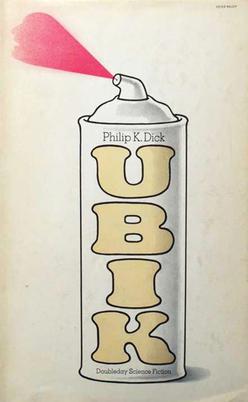
Ubik is a 1969 science fiction novel by American writer Philip K. Dick. The story is set in a future 1992 where psychic powers are utilized in corporate espionage, while cryonic technology allows recently deceased people to be maintained in a lengthy state of hibernation. It follows Joe Chip, a technician at a psychic agency who begins to experience strange alterations in reality that can be temporarily reversed by a mysterious store-bought substance called Ubik. This work expands upon characters and concepts previously introduced in the vignette "What the Dead Men Say".

Do Androids Dream of Electric Sheep? is a 1968 dystopian science fiction novel by American writer Philip K. Dick. It is set in a post-apocalyptic San Francisco, where Earth's life has been greatly damaged by a nuclear global war, leaving most animal species endangered or extinct. The main plot follows Rick Deckard, a bounty hunter who has to "retire" six escaped Nexus-6 model androids, while a secondary plot follows John Isidore, a man of sub-par IQ who aids the fugitive androids.
"We Can Remember It for You Wholesale" is a science fiction novelette by American writer Philip K. Dick, first published in The Magazine of Fantasy & Science Fiction in April 1966. It features a melding of reality, false memory, and real memory. The story was adapted into the 1990 film Total Recall with Arnold Schwarzenegger as the story's protagonist; that film was remade in 2012 with Colin Farrell as the protagonist.
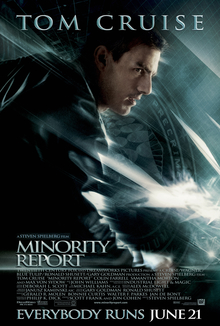
Minority Report is a 2002 American cyberpunk action film directed by Steven Spielberg, loosely based on Philip K. Dick's 1956 novella The Minority Report. The film takes place in the Washington metropolitan area in 2054, in which a specialized police department—Precrime—apprehends criminals by use of foreknowledge provided by three psychics called "precogs". The cast stars Tom Cruise as Precrime chief John Anderton, Colin Farrell as Department of Justice agent Danny Witwer, Samantha Morton as precog Agatha Lively, and Max von Sydow as Precrime director Lamar Burgess. The film combines elements of tech noir, whodunit, thriller, and science fiction genres, as well as being a traditional chase film, since the main protagonist is accused of a crime he has not committed and becomes a fugitive. Spielberg characterized the story as "fifty percent character and fifty percent very complicated storytelling with layers and layers of murder mystery and plot".
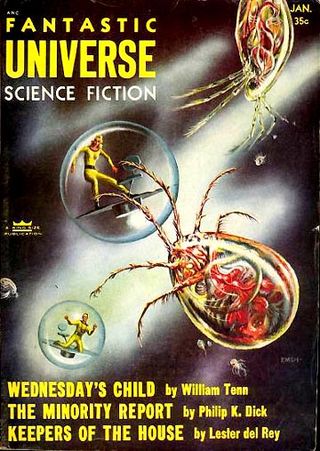
"The Minority Report" is a 1956 science fiction novella by American writer Philip K. Dick, first published in Fantastic Universe. In a future society, three mutants foresee all crime before it occurs. Plugged into a great machine, these "precogs" allow a division of the police called Precrime to arrest suspects before they can commit any actual crimes. When the head of Precrime, John Anderton, is himself predicted to murder a man whom he has never heard of, Anderton is convinced a great conspiracy is afoot.
"The Variable Man" is a science fiction novella by American writer Philip K. Dick, which he wrote and sold before he had an agent. It was first published in the British magazine Space Science Fiction Vol. 2 No. 2, July 1953, and in the American version in September 1953, with the US publication illustrated by Alex Ebel. Despite the magazine cover dates it is unclear whether the first publication was in the UK or in the United States where magazines tended to be published farther ahead of their cover dates than in the UK. The Variable Man can be found in several collections of Dick's short stories, including The Variable Man and The Short Happy Life of the Brown Oxford.
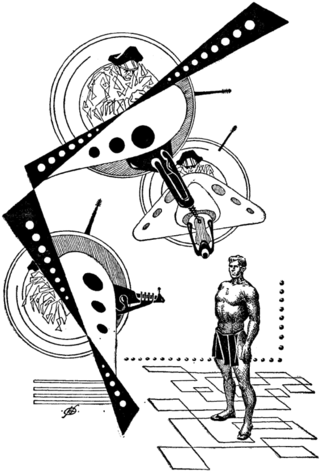
"The Golden Man" is an 11,600-word science fiction short story by American writer Philip K. Dick. It was received by the Scott Meredith Literary Agency on June 24, 1953, and first published in the April 1954 issue of If magazine. The story was illustrated by Kelly Freas in its original publication. The story is set in a post-apocalyptic future where the existence of potentially powerful mutants has become a reality. The mutants are seen as dangerous and have been hunted to death by human beings for years. A golden-skinned mutant called Cris is captured by the government, which attempts to execute him. However, his appearance and abilities to see into the future allow him to escape.
"The Last of the Masters" is a science fiction novelette by American writer Philip K. Dick. The original manuscript of the story was received by the Scott Meredith Literary Agency on July 15, 1953, and the story was published by the Hanro Corporation in the final issue of Orbit Science Fiction in 1954. It has since been reprinted in several Philip K. Dick story collections, beginning with The Golden Man in 1980.

"Shell Game" is a science fiction short story by American writer Philip K. Dick. It was submitted to the Scott Meredith Literary Agency and received by SMLA on December 12, 1953. It was published in Galaxy Science Fiction in September 1954.

"A World of Talent" is a science fiction short story by American writer Philip K. Dick, first published in Galaxy Science Fiction magazine.
"Roog" is a science fiction short story by American writer Philip K. Dick. It was his first sold work, although not his first published story.
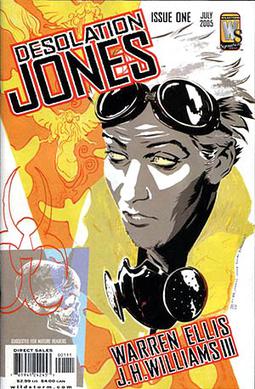
Desolation Jones was a bimonthly comic book series written by Warren Ellis. Art for the first six-issue storyline was provided by J.H. Williams III and José Villarrubia. The interrupted second storyline was illustrated by Danijel Zezelj and Villarrubia. The series is published by the Wildstorm imprint of DC Comics; it was launched in July 2005.

William Ronald Dodds Fairbairn FRSE was a Scottish psychiatrist, psychoanalyst and a central figure in the development of the Object Relations Theory of psychoanalysis. He was generally known and referred to as "W. Ronald D. Fairbairn".
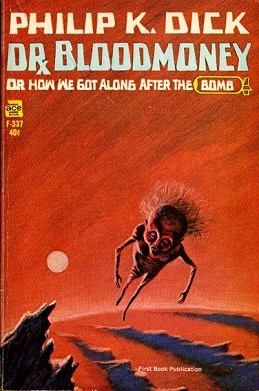
Dr. Bloodmoney, or How We Got Along After the Bomb is a 1965 science fiction novel by American writer Philip K. Dick. It was nominated for the Nebula Award for Best Novel in 1965.
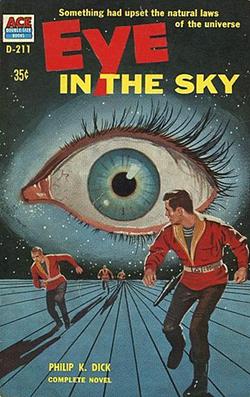
Eye in the Sky is a science fiction novel by American writer Philip K. Dick, originally published in 1957.
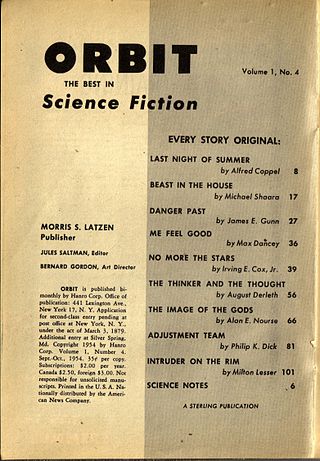
"Adjustment Team" is a science fiction short story by American writer Philip K. Dick. It was first published in Orbit Science Fiction with illustration by Faragasso. It was later reprinted in The Sands of Mars and Other Stories (Australian) in 1958, The Book of Philip K. Dick in 1973, The Turning Wheel and Other Stories in 1977, The Collected Stories of Philip K. Dick in 1987 (Underwood–Miller), 1988, 1990, Selected Stories of Philip K. Dick in 2002 and in The Early Work of Philip K. Dick, Volume One: The Variable Man & Other Stories in 2009.
In psychoanalysis, resistance is the individual's efforts to prevent repressed drives, feelings or thoughts from being integrated into conscious awareness.

The plot of the 2002 science fiction neo-noir film Minority Report, based on the 1956 short story of the same name by Philip K. Dick, includes a number of themes. The film's plot centers around a trio of psychics called "precogs", who see future images called "previsions" of crimes yet to be committed. These images are processed by "Precrime", a specialized police department, which apprehends the criminals based on the precogs' foreknowledge. The cast includes Tom Cruise as Precrime officer John Anderton, Colin Farrell as Department of Justice agent Danny Witwer, Samantha Morton as the senior precog Agatha, and Max von Sydow as Anderton's superior Lamar Burgess. The film is a combination of whodunit, thriller, and science fiction.

"The Builder" is a science fiction short story by American writer Philip K. Dick. It was first published in the magazine Amazing Stories, in December, 1953-January 1954, with illustration by Ed Emshwiller. Dick had submitted many short stories to magazines and made approximately fifteen sales before becoming a client of the Scott Meredith Literary Agency. This was his first SMLA submission, received by SMLA on July 23, 1952. His second SMLA submission was Meddler, received by SMLA on July 24, 1952. The SMLA file card for "The Builder" shows it was submitted to mainstream magazines The Atlantic Monthly and Harper's before it was submitted to Amazing Stories and has an SMLA sub-agent's notation, "IT ISN'T SCIENCE FICTION".

"The Impossible Planet" is a science fiction short story by American writer Philip K. Dick, first published in the October 1953 issue of Imagination. It has been reprinted over 30 times, including Brian Aldiss's 1974 Space Odysseys anthology. It was also published in Dutch, French, German and Italian translations. The writer originally submitted it to the Scott Meredith Literary Agency on February 11, 1953, with the title "Legend."
References
- ↑ "Philip K. Dick - Author - Short Stories - Bibliography". Archived from the original on 2010-07-23. Retrieved 2011-06-27.